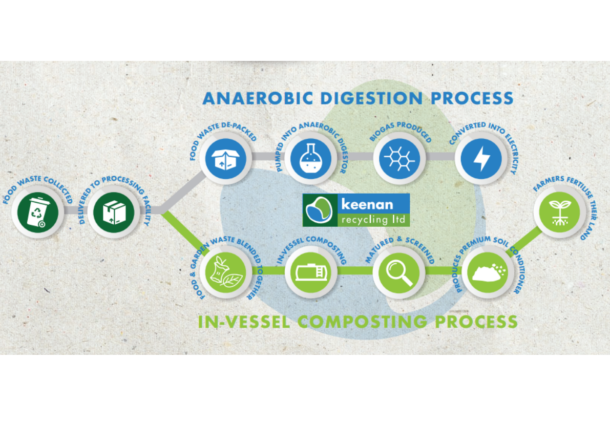Recycling at LUU
Organic waste
Yes:
- Cooked & uncooked meat
- Fruit & vegetables
- Leftovers
- Liquids (e.g. soup or milk)
- Coffee grounds
- Small bones (e.g. chicken)
No:
- Plants with soil
- General waste/plastic
- Compostable bags/packaging
- Large bones
- Glass
- Cutlery
- Metal
Journey of your waste
Organic waste can be recycled via two methods on an industrial scale – most commonly through anaerobic digestion (which is what our waste provider, Liliwaste, does).
In anaerobic digestion, bacteria break down organic materials in the absence of oxygen, to produce biogas (mainly methane and carbon dioxide) and digestate.
The biogas naturally created in the sealed tanks is used as a fuel in a CHP (combined heat and power) unit to generate renewable energy, i.e. electricity and heat.
What’s left from the process is digestate – a nutrient rich biofertiliser which is pasteurised to kill any pathogens and then stored in large covered tanks ready to be applied twice a year on farmland in place of fossil fuel derived fertilisers.

Compostable vs. biodegradable materials
The term ‘biodegradable’ is often misleading and can be confusing when trying to determine whether something is made of sustainable materials or not.
Technically, all materials, organic and inorganic, are biodegradable over time – all things break down into their constituent parts when left for long enough. The issue is the timescale. A plastic bottle does break down, but takes 450 years to decompose in the open air.
The term ‘biodegradable’ also does not make reference to what the material breaks down into, or the impact on the environment made by its breakdown. We are increasingly seeing ‘microplastics’ in our soil, oceans and even our own bodies, which have harmful impacts as they move through the eco stream.
Mixed recycling
Yes:
- Empty plastic bottles
- Paper
- Newspaper
- Brown or corrugated card, boxes, packaging
- Empty tins and cans
No:
- Tissues or napkins
- Hand towels
- Shredded paper
- Coffee cups
- Food packaging like sandwich or crisp packets
Journey of your waste
Your dry mixed recycling is taken to Biffa, Transfer Station, where the material is tipped and sent through the site on a conveyer picking line. Individual recycling streams are segregated and then taken by artic bulker to Biffa, Linton Street, where the materials are bailed and processed via the materials commodity market place.
Why recycling matters
- Recycling a single aluminium can will save enough energy to power a TV for up to three hours or an iPod for up to twenty hours.
- It takes 95% less energy to recycle aluminium cans than it does to make new ones.
- It takes 70% less energy to recycle paper than it does to make it new from raw materials.
- Recycling a single plastic bottle will save enough energy to power a lightbulb for three hours or more.
- Each tonne of recycled paper saves 380 gallons of oil, 7000 gallons of water, and around 3 cubic metres of landfill space.
- It takes around 10 litres of water to make just one sheet of A4 paper.
- Recycling five plastic bottles creates enough insulating fibre to fill a ski jacket.
Soft plastics
You can recycle soft plastics using the bin in the Coop (grey bin, blue lid) next to the tills.
Soft plastics include everything from crisp packets and rice pouches to cling film and pasta bags.
Glass
For the safety of our cleaning team, you cannot put glass in the mixed dry recycling bins. Please return glass bottles to Common Ground or Old Bar tills, so the team can recycle these safely.
Why it matters:
- Glass is 100% recyclable and can be reused over and over again, without losing quality.
- Every tonne of glass recycled saves 246 kg of CO2 emissions.
Electrical and electronic equipment
Drop your used batteries on the desk near the Activities Office.
Why it matters:
- It is estimated that we throw away over 600m batteries in the UK each year.
- Only 27% of batteries are recycled in the UK, resulting in more than 20,000 tonnes of battery waste straight to the landfill.
- It takes fifty times more energy to make a battery than the finished product produces.



